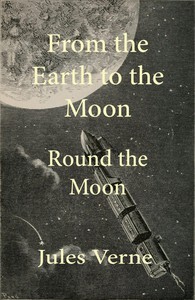The Moon-Voyage by Jules Verne (mobi ebook reader .txt) 📖

- Author: Jules Verne
Book online «The Moon-Voyage by Jules Verne (mobi ebook reader .txt) 📖». Author Jules Verne
Produced by Norm Wolcott, Gregory Margo and PG Distributed Proofreaders
THE MOON-VOYAGE. CONTAINING "FROM THE EARTH TO THE MOON," AND "ROUND THE MOON." BY JULES VERNE, AUTHOR OF "TWENTY THOUSAND LEAGUES UNDER THE SEA," "AMONG THE CANNIBALS," ETC. ILLUSTRATED BY HENRY AUSTIN.* * * * *
CONTENTS. "FROM THE EARTH TO THE MOON." I. THE GUN CLUB II. PRESIDENT BARBICANE'S COMMUNICATION III. EFFECT OF PRESIDENT BARBICANE'S COMMUNICATION IV. ANSWER FROM THE CAMBRIDGE OBSERVATORY V. THE ROMANCE OF THE MOON VI. WHAT IT IS IMPOSSIBLE TO IGNORE AND WHAT IS NO LONGER ALLOWED TO BE BELIEVED IN THE UNITED STATES VII. THE HYMN OF THE CANNON-BALL VIII. HISTORY OF THE CANNON IX. THE QUESTION OF POWDERS X. ONE ENEMY AGAINST TWENTY-FIVE MILLIONS OF FRIENDS XI. FLORIDA AND TEXAS XII. "URBI ET ORBI" XIII. STONY HILL XIV. PICKAXE AND TROWEL XV. THE CEREMONY OF THE CASTING XVI. THE COLUMBIAD XVII. A TELEGRAM XVIII. THE PASSENGER OF THE ATLANTA XIX. A MEETING XX. THRUST AND PARRY XXI. HOW A FRENCHMAN SETTLES AN AFFAIR XXII. THE NEW CITIZEN OF THE UNITED STATES XXIII. THE PROJECTILE COMPARTMENT XXIV. THE TELESCOPE OF THE ROCKY MOUNTAINS XXV. FINAL DETAILS XXVI. FIRE XXVII. CLOUDY WEATHER XXVIII. A NEW STAR* * * * *
"ROUND THE MOON." PRELIMINARY CHAPTER. CONTAINING A SHORT ACCOUNT OF THE FIRST PART OF THIS WORK TO SERVE AS PREFACE TO THE SECOND I. FROM 10.20 P.M. TO 10.47 P.M. II. THE FIRST HALF-HOUR III. TAKING POSSESSION IV. A LITTLE ALGEBRA V. THE TEMPERATURE OF SPACE VI. QUESTIONS AND ANSWERS VII. A MOMENT OF INTOXICATION VIII. AT SEVENTY-EIGHT THOUSAND ONE HUNDRED AND FOURTEEN LEAGUES IX. THE CONSEQUENCES OF DEVIATION X. THE OBSERVERS OF THE MOON XI. IMAGINATION AND REALITY XII. OROGRAPHICAL DETAILS XIII. LUNAR LANDSCAPES XIV. A NIGHT OF THREE HUNDRED AND FIFTY-FOUR HOURS AND A HALF XV. HYPERBOLA OR PARABOLA XVI. THE SOUTHERN HEMISPHERE XVII. TYCHO XVIII. GRAVE QUESTIONS XIX. A STRUGGLE WITH THE IMPOSSIBLE XX. THE SOUNDINGS OF THE SUSQUEHANNA XXI. J.T. MASTON CALLED IN XXII. PICKED UP XXIII. THE END* * * * *
FROM THE EARTH TO THE MOON.* * * * *
CHAPTER I. THE GUN CLUB.During the Federal war in the United States a new and very influential club was established in the city of Baltimore, Maryland. It is well known with what energy the military instinct was developed amongst that nation of shipowners, shopkeepers, and mechanics. Mere tradesmen jumped their counters to become extempore captains, colonels, and generals without having passed the Military School at West Point; they soon rivalled their colleagues of the old continent, and, like them, gained victories by dint of lavishing bullets, millions, and men.
But where Americans singularly surpassed Europeans was in the science of ballistics, or of throwing massive weapons by the use of an engine; not that their arms attained a higher degree of perfection, but they were of unusual dimensions, and consequently of hitherto unknown ranges. The English, French, and Prussians have nothing to learn about flank, running, enfilading, or point-blank firing; but their cannon, howitzers, and mortars are mere pocket-pistols compared with the formidable engines of American artillery.
This fact ought to astonish no one. The Yankees, the first mechanicians in the world, are born engineers, just as Italians are musicians and Germans metaphysicians. Thence nothing more natural than to see them bring their audacious ingenuity to bear on the science of ballistics. Hence those gigantic cannon, much less useful than sewing-machines, but quite as astonishing, and much more admired. The marvels of this style by Parrott, Dahlgren, and Rodman are well known. There was nothing left the Armstrongs, Pallisers, and Treuille de Beaulieux but to bow before their transatlantic rivals.
Therefore during the terrible struggle between Northerners and Southerners, artillerymen were in great request; the Union newspapers published their inventions with enthusiasm, and there was no little tradesman nor naïf "booby" who did not bother his head day and night with calculations about impossible trajectory engines.
Now when an American has an idea he seeks another American to share it. If they are three, they elect a president and two secretaries. Given four, they elect a clerk, and a company is established. Five convoke a general meeting, and the club is formed. It thus happened at Baltimore. The first man who invented a new cannon took into partnership the first man who cast it and the first man that bored it. Such was the nucleus of the Gun Club. One month after its formation it numbered eighteen hundred and thirty-three effective members, and thirty thousand five hundred and seventy-five corresponding members.
One condition was imposed as a sine quâ non upon every one who wished to become a member—that of having invented, or at least perfected, a cannon; or, in default of a cannon, a firearm of some sort. But, to tell the truth, mere inventors of fifteen-barrelled rifles, revolvers, or sword-pistols did not enjoy much consideration. Artillerymen were always preferred to them in every circumstance.
"The estimation in which they are held," said one day a learned orator of the Gun Club, "is in proportion to the size of their cannon, and in direct ratio to the square of distance attained by their projectiles!"
A little more and it would have been Newton's law of gravitation applied to moral order.
Once the Gun Club founded, it can be easily imagined its effect upon the inventive genius of the Americans. War-engines took colossal proportions, and projectiles launched beyond permitted distances cut inoffensive pedestrians to pieces. All these inventions left the timid instruments of European artillery far behind them. This may be estimated by the following figures:—
Formerly, "in the good old times," a thirty-six pounder, at a distance of three hundred feet, would cut up thirty-six horses, attacked in flank, and sixty-eight men. The art was then in its infancy. Projectiles have since made their way. The Rodman gun that sent a projectile weighing half a ton a distance of seven miles could easily have cut up a hundred and fifty horses and three hundred men. There was some talk at the Gun Club of making a solemn experiment with it. But if the horses consented to play their part, the men unfortunately were wanting.
However that may be, the effect of these cannon was very deadly, and at each discharge the combatants fell like ears before a scythe. After such projectiles what signified the famous ball which, at Coutras, in 1587, disabled twenty-five men; and the one which, at Zorndorff, in 1758, killed forty fantassins; and in 1742, Kesseldorf's Austrian cannon, of which every shot levelled seventy enemies with the ground? What was the astonishing firing at Jena or Austerlitz, which decided the fate of the battle? During the Federal war much more wonderful things had been seen. At the battle of Gettysburg, a conical projectile thrown by a rifle-barrel cut up a hundred and seventy-three Confederates, and at the passage of the Potomac a Rodman ball sent two hundred and fifteen Southerners into an evidently better world. A formidable mortar must also be mentioned, invented by J.T. Maston, a distinguished member and perpetual secretary of the Gun Club, the result of which was far more deadly, seeing that, at its trial shot, it killed three hundred and thirty-seven persons—by bursting, it is true.
What can be added to these figures, so eloquent in themselves? Nothing. So the following calculation obtained by the statistician Pitcairn will be admitted without contestation: by dividing the number of victims fallen under the projectiles by that of the members of the Gun Club, he found that each one of them had killed, on his own account, an average of two thousand three hundred and seventy-five men and a fraction.
By considering such a result it will be seen that the single preoccupation of this learned society was the destruction of humanity philanthropically, and the perfecting of firearms considered as instruments of civilisation. It was a company of Exterminating Angels, at bottom the best fellows in the world.
It must be added that these Yankees, brave as they have ever proved themselves, did not confine themselves to formulae, but sacrificed themselves to their theories. Amongst them might be counted officers of every rank, those who had just made their début in the profession of arms, and those who had grown old on their gun-carriage. Many whose names figured in the book of honour of the Gun Club remained on the field of battle, and of those who came back the greater part bore marks of their indisputable valour. Crutches, wooden legs, articulated arms, hands with hooks, gutta-percha jaws, silver craniums, platinum noses, nothing was wanting to the collection; and the above-mentioned Pitcairn likewise calculated that in the Gun Club there was not quite one arm amongst every four persons, and only two legs amongst six.
But these valiant artillerymen paid little heed to such small matters, and felt justly proud when the report of a battle stated the number of victims at tenfold the quantity of projectiles expended.
One day, however, a sad and lamentable day, peace was signed by the survivors of the war, the noise of firing gradually ceased, the mortars were silent, the howitzers were muzzled for long enough, and the cannon, with muzzles depressed, were stored in the arsenals, the shots were piled up in the parks, the bloody reminiscences were effaced, cotton shrubs grew magnificently on the well-manured fields, mourning garments began to be worn-out, as well as sorrow, and the Gun Club had nothing whatever to do.
Certain old hands, inveterate workers, still went on with their calculations in ballistics; they still imagined gigantic bombs and unparalleled howitzers. But what was the use of vain theories that could not be put in practice? So the saloons were deserted, the servants slept in the antechambers, the newspapers grew mouldy on the tables, from dark corners issued sad snores, and the members of the Gun Club, formerly so noisy, now reduced to silence by the disastrous peace, slept the sleep of Platonic artillery!
"This is distressing," said brave Tom Hunter, whilst his wooden legs were carbonising at the fireplace of the smoking-room. "Nothing to do! Nothing to look forward to! What a tiresome existence! Where is the time when cannon awoke you every morning with its joyful reports?"
"That time is over," answered dandy Bilsby, trying to stretch the arms he had lost. "There was some fun then! You invented an howitzer, and it was hardly cast before you ran to try it on the enemy; then you went back to the camp with an encouragement from Sherman, or a shake of the hands from MacClellan! But now the generals have gone back to their counters, and instead of cannon-balls they expedite inoffensive cotton bales! Ah, by Saint Barb! the future of artillery is lost to America!"
"Yes, Bilsby," cried Colonel Blomsberry, "it is too bad! One fine morning you leave your tranquil occupations, you are drilled in the use of arms, you leave Baltimore for the battle-field, you conduct yourself like a hero, and in two years, three years at the latest, you are obliged to leave the fruit of so many fatigues, to go to sleep in deplorable idleness, and keep your hands in your pockets."
The valiant colonel would have found it very difficult to give such a proof of his want of occupation, though it was not the pockets that were wanting.
"And no war in prospect, then," said the famous J.T. Maston, scratching his gutta-percha cranium with his steel hook; "there is not a cloud on the horizon now that there is so much to do in the science of artillery! I myself finished this very morning a diagram with plan, basin, and elevation of a mortar destined to change the laws of warfare!"
"Indeed!" replied Tom Hunter, thinking involuntarily of the Honourable
J.T. Maston's last essay.
"Indeed!"
 Have you ever thought about what fiction is? Probably, such a question may seem surprising: and so everything is clear. Every person throughout his life has to repeatedly create the works he needs for specific purposes - statements, autobiographies, dictations - using not gypsum or clay, not musical notes, not paints, but just a word. At the same time, almost every person will be very surprised if he is told that he thereby created a work of fiction, which is very different from visual art, music and sculpture making. However, everyone understands that a student's essay or dictation is fundamentally different from novels, short stories, news that are created by professional writers. In the works of professionals there is the most important difference - excogitation. But, oddly enough, in a school literature course, you don’t realize the full power of fiction. So using our website in your free time discover fiction for yourself.
Have you ever thought about what fiction is? Probably, such a question may seem surprising: and so everything is clear. Every person throughout his life has to repeatedly create the works he needs for specific purposes - statements, autobiographies, dictations - using not gypsum or clay, not musical notes, not paints, but just a word. At the same time, almost every person will be very surprised if he is told that he thereby created a work of fiction, which is very different from visual art, music and sculpture making. However, everyone understands that a student's essay or dictation is fundamentally different from novels, short stories, news that are created by professional writers. In the works of professionals there is the most important difference - excogitation. But, oddly enough, in a school literature course, you don’t realize the full power of fiction. So using our website in your free time discover fiction for yourself. 




Comments (0)